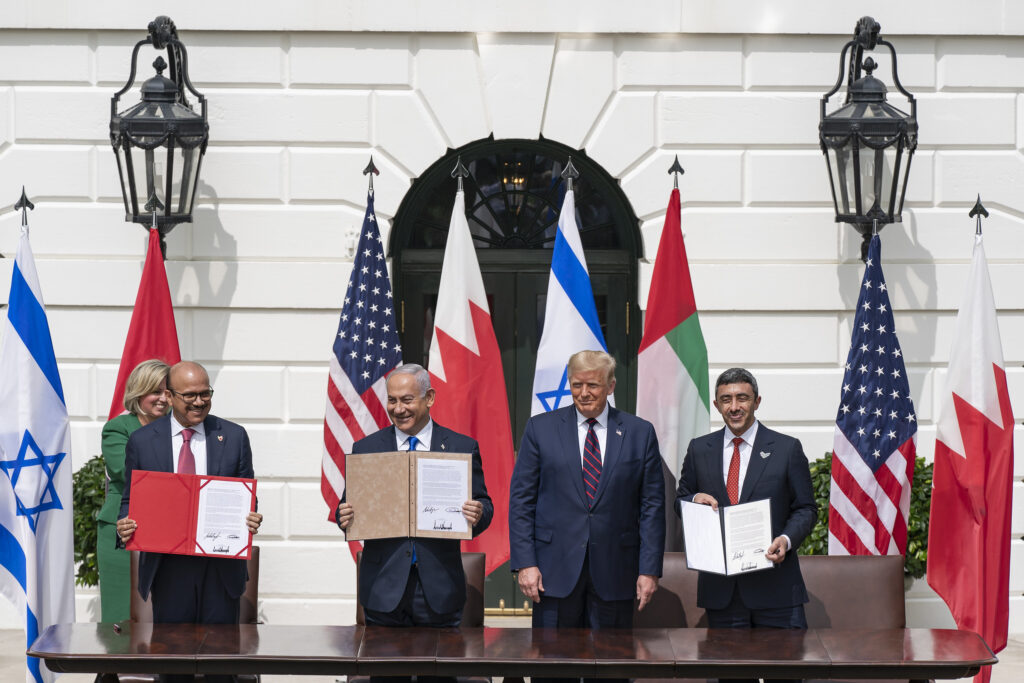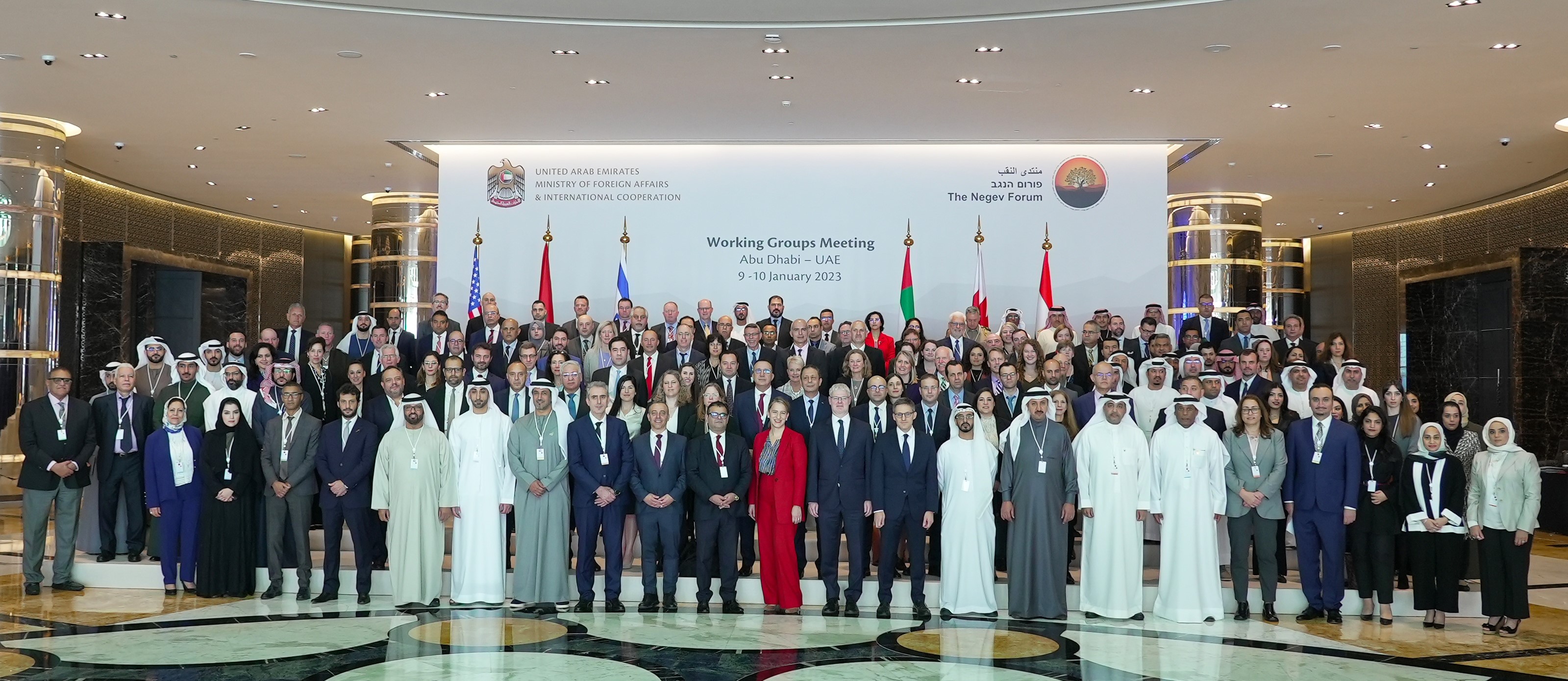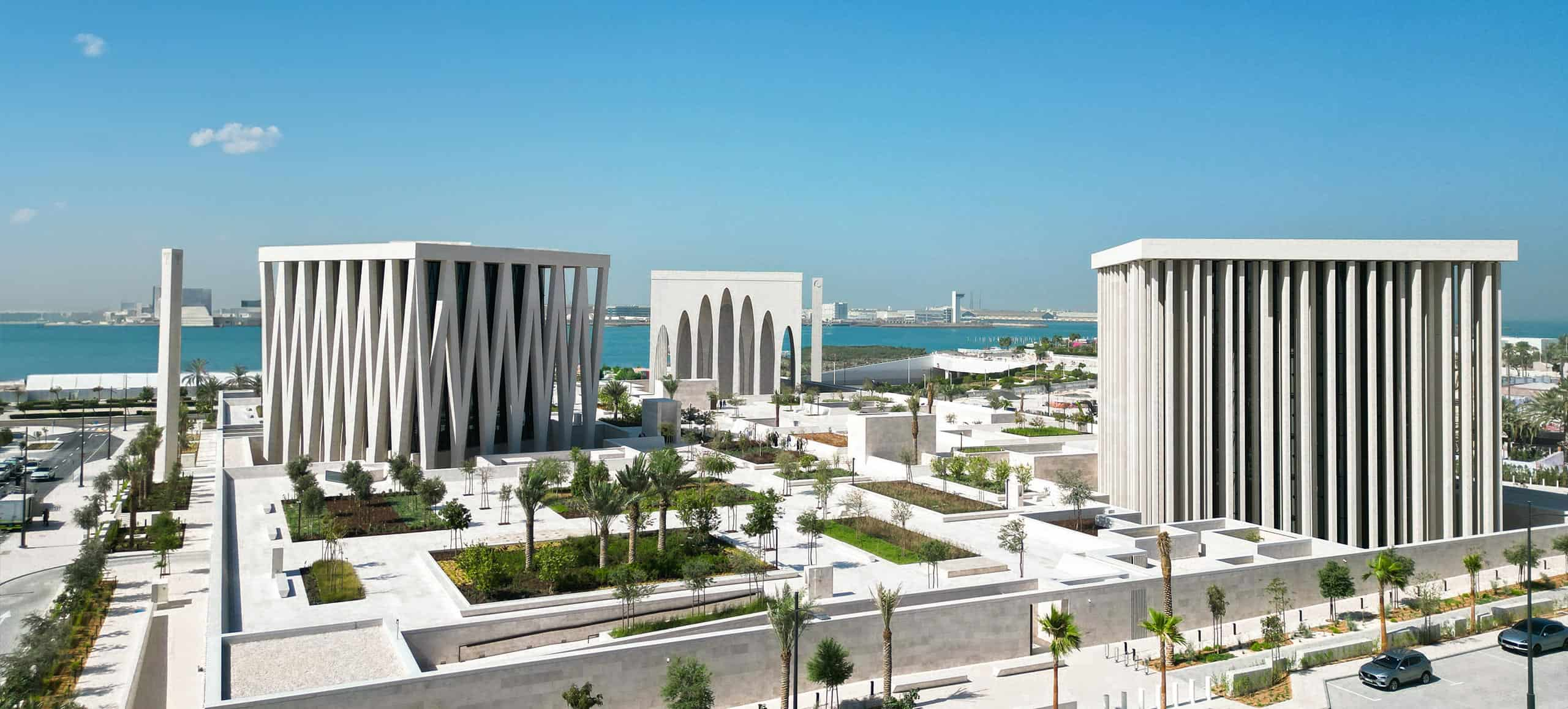Middle East: building peace with the Abraham Accords
Middle East: building peace with the Abraham Accords
Analysis by Silvia Verdoljak
Facing the horrors of war, theoretical pacifism solves nothing and diverts attention from the effective actions necessary to relieve the victims and to restore and maintain peace.
Indeed, victims don’t need words of solidarity; rather, they need effective humanitarian aid, while restoring and maintaining peace requires political-diplomatic actions based on objective analyses of the causes of the conflict and of the means to overcome them.
The current “Gaza war” was provoked by the Hamas terrorists, who, on October 7, committed a horrible slaughter of Israeli civilians, taking elderly people, women, and children as hostages, and are using the Palestinian civilian population as human shields in order to accuse the Israeli military reaction of genocide.
On the rest of the world, this strategy resulted in extraordinary political and moral confusion, ranging from anti-Jewish racial hatred to anti-Muslim racial hatred, and the pacifist illusion that a military ceasefire with the terrorists could establish peace.
This is an illusion because the Hamas leaders themselves admitted unleashing the October 7 massacre to prevent the normalization of political, economic, and cultural relations between the Arab States and Israel, a process successfully promoted by the United States with the “Abraham Accords”.
The reason is evident. Hamas and terrorist organizations alike are not protectors of Islàm, rather, they are tools of destabilization used to trigger and maintain in the guise of wars of religion conflicts that, instead, are grounded in political, economic, and strategic reasons.
This is evident in the very inhuman ferocity of the October 7 attack, with which Hamas leaders and mercenaries violated all of Islàm’s holy principles regarding the upholding of peace, forbidding profiteering from war, the protection and respect of the harmless, of women, of children, and of prisoners, as well as forbidding brutalities and barbarities against the dignity of human beings.
With the Abraham Accords, the signatory states break this infernal game, recognizing the fact that Judaism, Christianity, and Islàm – the Religions of the Book – are three fundamental spiritual pathways that stretch from the same root, symbolized by Patriarch Abraham, towards the same supreme Reality.
On this recognition, the signatory states ground the normalization of their relations of economic, scientific, cultural, and interfaith cooperation in political and spiritual harmony, which is an essential condition to consolidate peace, and overcome ghosts and prejudice.
This means that after the military operations needed to eliminate the threat of terrorism, efforts to reach those peace agreements with all Muslim states of the Middle East and North Africa must intensify.
It was Secretary of State Antony Blinken who reiterated this in his December 2 official statement on the occasion of the National Day of the United Arab Emirates (UAE), which is bound to the US by more than five decades of friendship and partnership in maintaining peace in the Middle East.
In particular, Secretary Blinken recalled that the shared commitment to advance regional peace and stability in the region, deterring threats, de-escalating conflicts, and promoting an affirmative agenda of prosperity and peaceful coexistence is now embodied in the Abraham Accords.
Consequently, it should be evident also in Europe that it is impossible to eliminate once and for all the threat of Hamas and of other pseudo-Islamic terrorist organizations alike without the active cooperation of the Arab States, of the other Muslim States, and of their political and religious authorities.
And it is a cooperation that is already in progress, on the courageous and strong initiative of the US and with successes extraordinary enough that the politicians and the media of the European and extra-European States interested in the destabilization of the region do not provide the information necessary to properly inform public opinion.
For those reasons, we consider it duly offering our readers a synthesis of the information that is essential to overcome prejudices that, as such, worsen the reasons for conflict instead of favoring peace.
Origin and development of the Abraham Accords
The first Abraham Accords were signed on September 15, 2020, during a ceremony at the White House attended by representatives of the United States, Israel, Bahrain, and the United Arab Emirates.

Sept. 15, 2020, White House. Abraham Accords Signing Ceremony. President Donald J. Trump, Minister of Foreign Affairs of Bahrain Dr. Abdullatif bin Rashid Al-Zayani, Israeli Prime Minister Benjamin Netanyahu and Minister of Foreign Affairs for the United Arab Emirates Abdullah bin Zayed Al Nahyan participate in the signing of the first Abraham Accords.
On October 22, 2020, the Bahraini “King HamadGlobal Centre for Peaceful Coexistence” and the US Office of the Special Envoy to Monitor and Combat Antisemitism (SEAS) signed in Washington a Memorandum of Understanding on Antisemitism, which recognizes that Jews and Muslims need to join forces in a world where both people are threatened by prejudice and discrimination.
Morocco normalized its relations with Israel in December 2020, and one month later, in January 2021, Sudan signed the “Abraham Accords Declaration” initiating negotiations on normalization with Israel.
The peace initiative between the Jewish world and the Islamic world won President Donald J. Trump a nomination for the Nobel Peace Prize.
The Biden Administration has declared that it is “building on the work of the Trump administration” and expressed the intention to establish a new position to promote peace in the Middle East and extend the Abraham Accords.
In March 2022, Israel hosted the Negev Summit regarding the implementation of the Abraham Accords. On Israel’s initiative, the Summit was attended by the Foreign Ministers of Egypt, Morocco, Bahrain, and the United Arab Emirates, as well as US Secretary of State Antony Blinken.
During the meeting, participants decided to repeat the initiative as an annual Forum to promote economic investments, cultural exchanges, and to protect peace and stability in the region, in particular by noting Iran’s nuclear ambitions.
In January 2023, the Negev Forum met in Abu Dhabi, the EAU’s capital, with the participation of the host country, Bahrain, Egypt, Morocco, Israel, and the United States. On this occasion, economic cooperation was expanded to the fields of science and emerging technologies.
So far, Israel has suggested the United States evaluate the extension of the Abraham Accords to Indonesia, Niger, Mauritania, and Somalia, while Oman and Jordan came forward expressing their interest.
The interest of the Hashemite Kingdom of Jordan is especially important because of its role as Custodian of Jerusalem’s Holy Sites and moderator in the Israeli-Palestinian conflict. In 1994, Jordan became the second Arab state, after Egypt (1979), to sign a Peace Treaty with Israel.
The economic and cultural results of the Abraham Accords in their first three years are extraordinary. Trade among the signature states generated more than $3.37 Billion, and the establishment of 17 new flights (2022) allowed almost half a million Israeli tourists to visit their Arab neighboring states for the first time.
As early as 2021, only one year after the signature of the first agreements, there were already plenty of witnesses (including but not limited to the English language) of Middle-Eastern youth of all faiths and ethnicities who were telling, with excitement, about the new possibility to visit holy places and see traditional events never accessible before, discovering cultural and spiritual worlds previously unknown to them.
In 2021 the Abraham Accords Peace Institute was established in Washington. Its main goal is to encourage efforts to promote dialogue among different faiths and cultures to build peace “among the three Abrahamic religions and all humanity.”.
In 2023, the United Arab Emirates inaugurated the “Abrahamic Family House” consisting of a synagogue, a mosque, a church, and an educational center to promote mutual understanding among people of all faiths. This ecumenic cultural complex was established following the 2019 Final Declaration on Human Fraternity signed by Pope Francis for the Roman Catholic Church, and by Sheikh Ahmed el-Tayeb, the 44th Grand Imam of Al-Azhar.
Between June and August 2023, talks between the US and Saudi Arabia for the normalization of relations with Israel intensified and included robust peace proposals to favor the Palestinian people.
Those would be decisive agreements because of Saudi Arabia’s political, economic, and strategic importance, and also because its King also exercises the role of Custodian of the Two Holy Mosques of Medina and the Mecca.
As for the Palestinians, both parties agreed that Gaza could no longer be ruled by Hamas terrorists and used as a base to launch attacks against Israel, and they were working on a substantial package of effective measures to establish a peaceful, demilitarized, and independent Palestinian state.
In view of this, the National Palestinian Authority and Jordan were both invited to the January 2023 Abu Dhabi Negev Forum.
On September 20, 2023, Saudi Crown Prince Mohammed bin Salman told Fox News that a normalization deal with Israel was closer by the day. US Secretary of State Antony Blinken was going to visit Saudi Arabia for this reason in mid-October.

Members of the Negev Forum working groups in Abu Dhabi. Source of the photo: the UAE Foreign Ministry.
The criminal interruption and its aftermath
On October 7th, the heads of Hamas attempted to jeopardize the whole peace process by attacking Israel with mercenaries charged with targeting civilians in an inhumane massacre and by heading back to Gaza with hostages to use the prisoners and the Palestinian people as human shields against the Israeli military reaction.
The date Hamas chose for the slaughter was also a holiday (the last Shabbat of Sukkot, which was also the 50th anniversary of the 1973 Yom Kippur War, when the Egyptian and Syrian armies invaded without a war declaration the State of Israel to annihilate it, with the support of 11 more Arab or Muslim States, of the Soviet Union, of Easter Germany, of Cuba, and of North Korea).
The criminal plan of the Hamas leadership had propagandistic effects, disorienting public opinion, but in practice, it achieved the opposite of its goal. Indeed, Israel counterattacked to ultimately uproot terrorists from Gaza, while both the US and the Saudi government confirmed their intention to work forward on the peace agreements.
For the US, Secretary of State Antony Blinken confirmed this stance as early as on October 24th, 2023 before the United Nations Security Council with extreme clarity:
«Two paths lie before us. The difference between them could not be more stark.
One is the path offered by Hamas. We know where it leads: death, destruction, suffering, darkness.
The other is the path toward greater peace, greater stability, greater opportunity, greater normalization and integration – a path toward people across the region being able to live, to work, to worship, to learn side by side, a path toward Palestinians realizing their legitimate right to self-determination and a state of their own.
Nothing would be a greater victory for Hamas than allowing its brutality to send us down its path of terrorism and nihilism. We must not let it. Hamas does not get to choose for us.
The United States stands ready to work with anyone who’s ready to forge a more peaceful and secure future for the region – a future its people yearn for and so deserve.».
U.S. Secretary of State Antony Blinken addresses the United Nations Security Council, New York, October 24th, 2023. Source: U.S. Department of State.
Hopefully reason prevails and the energies wasted in political disputes regarding the Palestinian question be rather used responsibly to send humanitarian aid to the victims of the ongoing war and to promote the Abraham Accords.
Furthermore, the strategic, economic, and moral value of the Abraham Accords is not about the Middle East alone, because they can be extended in the form of normalization of relations between the State of Israel and other Muslim States that don’t recognize it yet or lack diplomatic relations with it.
Religions as instruments of peace
The efficacy of the Abraham Accords consists in being aware that while ignorance and fanaticism use religions as grounds for conflict, knowledge and reason recognize them as converging spiritual paths of peace and universal brotherhood.
It is no coincidence that the political-diplomatic application of this principle to the resolution of conflicts in the Middle East is proposed by the United States of America and not by any other country; there is a reason for that.
The reason is that a multireligious and multiethnic society is the founding characteristic of the United States of America, inhabited by settlers escaping the political-religious persecution of European regimes starting with the Pilgrim Fathers in the early XVII century, continuing with Shoah survivors in the XX century, and up to the Rohingya, muslims escaping the ongoing genocide at the hands of the Burma regime.
The US political thought that places ethical, legal, and social primacy on freedom of religion as “America’s first freedom” is grounded in the Virginia Statute for Religious Freedom written by Thomas Jefferson and approved in 1786, which lays the foundation for the First Amendment of the Constitution of the United States of America.
This principle does also reflect in recent US foreign policy, in which the Trump Administration’s Secretary of State, Michael R. Pompeo, recalled that only coexistence can “give nations that are torn apart by religious conflict hope that people of different faiths can live in unity.”
With the Biden Administration the same principles are now motivating the work of Secretary of State Antony Blinken, who is inspired also by his stepfather Samuel Pisar (1929-2015), famous international lawyer and advisor of the Kennedy (1961-1963) and Nixon Administration (1969-1974), as well as Nobel Peace Prize candidate.
From peace to reconciliation: precedents
Peace is also the premise for the next step in the normalization of relations among States in order to overcome the negative moral consequences of historical conflicts: reconciliation.
Reconciliation among the parties to a conflict, or their descendants, is not obtained by canceling the memory of the facts, of wrongs, and of reasons; rather, it is obtained by their objective recognition, accompanied by the will to not repeat the mistakes of the past and to overcome their legacy of sorrow, hate, and prejudice to build together a world of peace and fraternity.
The most significant and effective modern example of this is the German-Czech Declaration on the Mutual Relations and their Future Development (LINK) signed in Prague in 1997, followed in 1998 by the establishment of a “Fund for the Future” (Zukunftsfund) to sponsor initiatives for reconciliation and cooperation, and of a German-Czech Discussion Forum on the subject.
The 1997 German-Czech Declaration of Prague was drafted by both parties with courage for the truth in order to allow future generation to recognize and overcome the inhuman tragedies unleashed by German Nazis from 1938 and 1945, with the extermination of Jews, of the Romani people and of political opponents, ultimately causing the persecution and mass expulsion of Czechs whose mother language was German.
The 15th anniversary of the Declaration, celebrated in March 2013, consisted of a solemn reunion of the Forum in the German Parliamentary Association, with the presence of the president of the German Bundestag, Norbert Lammer, of the Czech Republic’s Foreign Minister, Karel Schwarzenberg, and of the vice president of the International Auschwitz Committee and a survivor of the Holocaust, Felix Kolmer, a Shoah survivor himself.
In their official remarks, Karl Schwarzenberg declared that the Declaration of Prague is a “corner stone” to build modern Europe, and Feliz Kolmer invited everyone to consider the extent of the journey both countries took in order to reach this point.
In March of this year (2023) Japan and South Korea announced they are embracing reconciliation to resolve sensitive historical issues, which this time consist of the atrocities committed by the Japanese Imperial Army in the 35 years they occupied Korea (especially after 1937, when Imperial Japan declared war on China) as well as the expulsion and discrimination of the respective ethnic communities in the aftermath of the war.
This means it is absolutely reasonable that, in the spirit of our era, with the extension of the Abraham Agreements, the normalization of relations among Arab states and Israel, as well as the establishment of an independent and demilitarized Palestinian State, are accompanied by an Arab-Israeli reconciliation process identical to that of the 1997 German-Czech declaration and of the current Japanese-Korean project.
Indeed, it should be clear to any person in good faith that this is the only master road to ultimately achieve peace and justice for the whole Middle East, and also that the firm will of the US and of the Arab States in this respect deserves the full support of the international community.
But it is also evident that, for the same reason, it is time to end the direct and indirect support that Hamas terrorists are receiving from irresponsible political factions of way too many States and Governments that, instead, have an interest in maintaining and worsening destabilization in the region.
© 22 Dicembre 2023


















